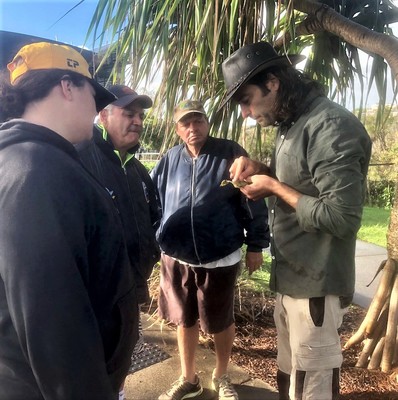Kabi Kabi traditional owners, working with researcher, Joel Fostin have been monitoring the state of health of our local Pandanus populations along the coastline from Caloundra to Coolum.
The past two decades have seen the Pandanus subject to dieback after the introduction of the north Queensland leafhopper, to which our local species has no resistance.
Sponsorship by Unitywater, together with in-kind assistance from Sunshine Coast Council, Coolum & North Shore Coast Care and Healthy Land Water, are providing resources for
monitoring of the Pandanus continued on from recent years of community work. Activities such as leaf stripping of Pandanus infested with the introduced leaf-hopper, translocation of the predatory wasp to assist with biological control, and direct seeding, help prevent the local Pandanus populations becoming further diminished.
Our local species, Pandanus tectorius, belongs to the vegetation community referred to as the ‘endangered coastal littoral rainforest and vine thicket’. The Commonwealth Government this year introduced a National Recovery Plan for this vegetation community. Unlike many other native trees or other species of Pandanus found in northern Australia, P. tectorius is not fire tolerant.
Pandanus provide an important ecological role along our dunes and headlands, by shading out numerous invasive weeds, and providing habitat within its foliage
to many species of mammals, reptiles, birds and insects. The Pandanus also has significant cultural heritage values to Kabi Kabi people for its food, fibre and shelter, and to the wider community as an iconic tree featuring in the scenic amenity along our coastlines.









